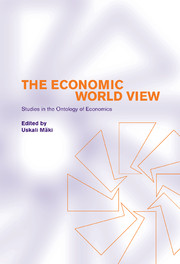Book contents
- Frontmatter
- Contents
- Notes on the contributors
- Preface
- I The what, why, and how of economic ontology
- II Rationality and homo economicus
- Part III Micro, macro, and markets
- Part IV The world of economic causes
- 14 Ceteris paribus laws and socio-economic machines
- 15 Tendencies, laws, and the composition of economic causes
- 16 Economics without mechanism
- Part V Methodological implications of economic ontology
- Name index
- Subject index
15 - Tendencies, laws, and the composition of economic causes
Published online by Cambridge University Press: 04 August 2010
- Frontmatter
- Contents
- Notes on the contributors
- Preface
- I The what, why, and how of economic ontology
- II Rationality and homo economicus
- Part III Micro, macro, and markets
- Part IV The world of economic causes
- 14 Ceteris paribus laws and socio-economic machines
- 15 Tendencies, laws, and the composition of economic causes
- 16 Economics without mechanism
- Part V Methodological implications of economic ontology
- Name index
- Subject index
Summary
John Stuart Mill is an empiricist and an inductivist. He believes that the grounds for beliefs concerning matters of fact are ultimately perceptual experiences and that generalizations are justified inductively by observation of their instances and implications. Yet Mill believes that inductive methods are not directly applicable to most subject matters. His methods of induction are suitable only to domains in which few causal factors are at work, while most subject matters involve the simultaneous action of many causal factors. The possibilities of experimental intervention increase the range of direct inductive inquiry, but that range is still limited.
Mill believes that scientific knowledge of complex subject matters can nevertheless be attained. If one is able to determine inductively the laws governing single causal factors, then one can deduce what the conse- quences of multiple causes acting simultaneously will be. Mill calls this procedure “the deductive method” or “the method a priori, ” but both names are misleading. The deductive method is, in fact, an indirect inductive method, in which the laws of individual causes are separately determined by inductive methods. The role of deduction is to determine what follows from these laws in complex circumstances. The evidence that inductively supports the premises of a deductive argument is supposed to be the inductive basis for one's belief in the argument's conclusions (1843, bk. 2, ch. 3, §3). In Mill's words:
When an effect depends on a concurrence of causes, these causes must be studied one at a time, and their laws separately investigated, if we wish, through the causes, to obtain the power of either predicting or controlling the effect; since the law of the effect is compounded of the laws of all the causes which determine it.
- Type
- Chapter
- Information
- The Economic World ViewStudies in the Ontology of Economics, pp. 293 - 307Publisher: Cambridge University PressPrint publication year: 2001
- 1
- Cited by



